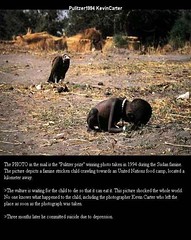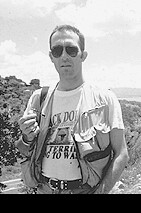What the hell is this?
The photo is the Pulitzer Prize winning photo taken in 1994 during the Sudan famine. The picture shows a famine stricken crawling towards a UN food camp located a kilometer away. The vulture is waiting for the child to die so that it can eat it. This picture shocked the whole world. No one knows what happened to the child, including the photographer Kevin Carter who left the place as soon as the photograph was taken. Three months later he commited suicide due to depression.

This is what the Kevin Carter wrote:
Dear God,
I promise I will never waste my food no matter how bad it can taste and how full I may be. I pray that He will protect this little boy, guide and deliver him away from his misery. I pray that we will be more sensitive towards the world around us and not be blinded by our own selfish nature and interests.
I hope this picture will always serve as a reminder to us that how fortunate we are and that we must never ever take things for granted.

Just two points I want to make:
- What kind of ethics do photojournalists have?
- Why the hell did this photo win the Pulitzer Prize? He should not have been awarded the prize, since he lacked any sense of ethics.






8 Comments:
Good post.
Do you think there is a parallel between rich nation tourists going to less developed nations?
I don't exactly get you. Can you be more explicit so that I can perhaps give you my opinion.
hey,..exactly...
the first thought came to mind...after loking at the photo..
is..
why couldnt the rich "photographer" feed something to the child rather than taking a photo??
it does ring some bells..doent it???
Dude, get real. There's nothing that is "right" or "wrong". everything is a matter of perspective. What might seem ethical to you, need not sound the same to me. I don't see anything wrong with Carter not doing anything. Maybe that's why his conscience ate him. (I call conscience a bitch.) but then, what would've you done if you were Kevin Carter?
Sir.."There's nothing that is 'right' and 'wrong'" is your perspective.
I cannot buy this argument that because everything depends on the way you look at it, you can close your eyes to everything around, or have no opinions about them. What if someone raped your wife in front of you? As a husband, in your perspective, it has to be wrong. But, you cannot sit and say, "everything depends on perspective. For the rapist, it is a pleasure. For me it is a pain. So I don't really know whether it is a pleasure or a pain, because you know, everything depends on the way you look at it. I am really confused as to what I shoud do". You cannot say something like this. This means something, that there is an accepted norms of behaviour in any society. And in the present day society, what he did is 'wrong'.
Now, a question we must ask is. Is there a universal standard of behaviour which is independent of who you aer, independent of time? Obviously yes. There are certain virtues that have been upheld as ideals since ages. Compassion is one of them. If he had an element of compassion, I doubt if he would have done what he did.
Whether I would have done anything? I don't know. My answer to this question itself raises a lot of questions about my priorities in life, and also about the factors that have made me prioritise them the way I have. One thing, I have never done anything to help the beggars that I see often except drop a coin. So, I shall not make the claim that I would have done something there. Taking this as an indication, I probably would have done exactly what Kevin did.
The whole question of ethics comes because of this conflict between what the heart says, and what you actually carry out in action. Ethics are guidelines for right behaviour. Therefore the question of what ethics photojournalists should have.
This is a very old debate...
When I argued a similar case (not the same) sometime ago, I was told quite bluntly that you cannot define 'ethics'. Ethics, apparently, is what each person defines for him(her)self. I do not completely agree with that point of view.
Anyways, coming to this particular episode, it is probably pertinent to ask the following question: Hasn't Kevin Carter served the cause of humanity better by actually publishing the phtograph and drawing the attention of the world to the situation in Sudan? As a professional, his ethics are quite clear: Do not interfere. (Imagine a wildlife photographer interfering in a cheetah's hunt). That is a job for, in this case, social activists. Whether one wants to be a social activist or a photographer is a matter of personal choice. But my point is that both are necessary in the scheme of things. One can't do both. Then, the image would not have so much power, and would not produce the same effect.
Rich photographer and poor child??? I know for a fact that most journalists/photographers who do work in famine struck places or for social causes are not really very well off. No one is outraged that, at the same time, there are fashion shows going on in Milan, where the photographers are earning thousands of dollars. Here we are, sitting in our comfortable chairs, passing judgement on a professional, who went through depression and committed suicide. I haven't read what the circumstances were, and whether he actually could have interfered. Moreover, do you think this was a one-off case? The country is being ravaged by a famine and people are dying everywhere. You are there on a press visa. I'm sure you cannot find enough food to feed all the starving children you see, even if you do have loads of money.
Let's not be judgemental. We aren't qualified to do that. And the qualified ones do not judge.
i like yuur points...u make sense.
Hey i am going to make ur blog my regular read man its awesome. Also i have the same damn pic on my blog and ur views are so true. What is man if he dosent help another man who is dying.
Post a Comment
<< Home